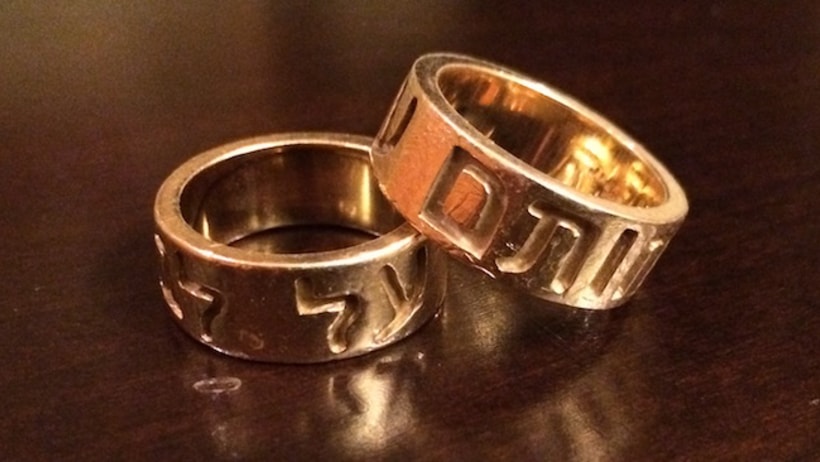My wedding band is inscribed with the words “As a seal upon your heart” in Hebrew. Originally from Kohelet (Ecclesiastes), this verse on my finger serves as a daily reminder in several ways. When Duncan and I were ring shopping, I wanted the “plain gold band” we’d need for the ceremony to also be one that we both felt comfortable wearing every day. Even if it was simply solid gold, I wanted something that was both beautiful and meaningful. My mother shared with me that she and my father had this verse inscribed on the inside of their rings. It didn’t take much convincing to get Duncan on board, and now we each have a constant symbol of our connection to one another as well as the link to my parents and their love too.

The memories we carry are often attached to certain unforgettable details like a song playing at a specific moment or the smells of a certain location. This also happens with clothing and jewelry. Maybe you remember down to the last detail the outfit you were wearing when you brought your first child home from the hospital. Perhaps there’s a piece of jewelry passed down from generation to generation. The tallit you wear on Shabbat and the person it belonged to before you may hold a special place in your heart.
Parshat Tetzaveh, which we read this week, details the specific clothing items that a priest and those close to him are to wear. This is special attire that distinguishes them from others in their service to God. These clothes are meant to add an aura of holiness to the priests as they complete their sacred duties. Since these vestments and garments are to be used for such a unique purpose, God also gives a special instruction regarding who is to make them. After we receive these specifics, we learn about the details of what is on each garment.
Chapter 28, verse 29 teaches: “Aaron shall carry the names of the sons of Israel on the breast piece of decision over his heart, when he enters the sanctuary, for remembrance before the Lord at all times.” That is to say that in all of Aaron’s work, he is to carry the “seal” upon his heart of those who have come before him. The high priest, in his role, is beholden to the names, experiences, and fates of those who came before him. The Ba’al Shem Tov, a Chassidic master, shares “Remembering is the source of redemption, while forgetting leads to exile.” Our identities have been shaped by those who came before us not only in their actions, but in our memories of them.
While we may not have a high priest today, we too are linked to those came before us. Whether the memory is preserved in the use of your great-grandmother’s candlesticks on Shabbat or telling the same jokes each year at Pesach, the sharing of that past is what will ensure a future.
My wedding band reminds me of the strength and love of my parents’ marriage and of the dedication Duncan and I have to each other to maintain our own bond. May we all be blessed first with the sweetness of fond memories and second with the kavanah, the intention, to learn and grow from the lessons they teach.
-Rabbi Eve Posen
Source: As a Seal Upon Your Heart – Parshat Tetzaveh 5776 – Rabbi Eve Posen



